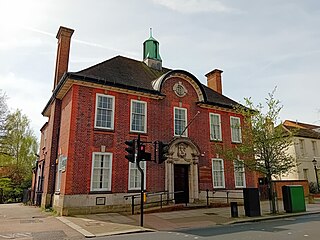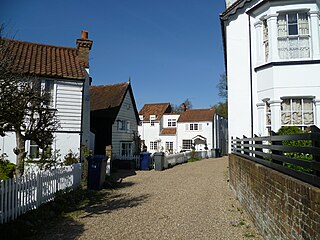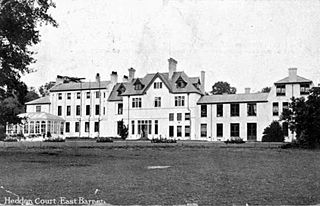
Chipping Barnet or High Barnet is a suburban market town in north London, forming part of the London Borough of Barnet, England. It is a suburban development built around a 12th-century settlement, and is located 10+1⁄2 miles (17 km) north-northwest of Charing Cross, 3 miles (4.8 km) east from Borehamwood, 5.2 miles (8.4 km) west from Enfield and 3.2 miles (5.1 km) south from Potters Bar. Its population, including its localities East Barnet, New Barnet, Hadley Wood, Monken Hadley, Cockfosters and Arkley, was 47,359 in 2011.

Barnet was a local government district in south Hertfordshire from 1863 to 1965 around the town of Barnet.

Potters Bar Urban District was a local government district in England from 1894 to 1974, covering the town of Potters Bar and the village of South Mimms. The district was initially called the South Mimms Rural District, being renamed in 1934.

Monken Hadley is a place in the London Borough of Barnet. An ancient country village north of Barnet, it is now a suburban development on the very edge of Greater London 11 miles (18 km) north north-west of Charing Cross, while retaining much of its rural character.

Enfield Highway is an area in the London Borough of Enfield, north London. It is roughly located in the area either side of Hertford Road between Hoe Lane and The Ride.
The High Sheriff of Hertfordshire was an ancient Sheriff title originating in the time of the Angles, not long after the foundation of the Kingdom of England, which was in existence for around a thousand years. On 1 April 1974, under the provisions of the Local Government Act 1972, the title of Sheriff of Hertfordshire was retitled High Sheriff of Hertfordshire. The High Shrievalties are the oldest secular titles under the Crown in England and Wales, their purpose being to represent the monarch at a local level, historically in the shires.

Ossulston House is a Grade II listed building opposite Joslin's Pond in Hadley Green Road, Hadley, to the north of Chipping Barnet. It is one of what was an almost complete line of houses between Chipping Barnet and Monken Hadley along the east side of Hadley Green which were built in the 18th and 19th centuries as wealthy merchants from London populated the area.
Charles Herbert Cottrell was an Englishman who travelled to Siberia in 1840-41, produced an account of the experience, and translated plays and non-fiction works from German to English. At home, he qualified as a barrister and was a magistrate of Hertfordshire and Wiltshire.

Charles Jack was an Irish farmer and landowner who was primarily responsible for the construction of Hadley Wood from the late 1880s, and the building of Hadley Wood railway station.

Beech Hill Park is a Grade II listed building off Beech Hill in Hadley Wood, North London, that is used today as the club house of Hadley Wood Golf Course. It was built in 1781 for Francis Russell, secretary and surveyor to the Duchy of Lancaster, on land he received when Enfield Chase was broken up. It was later in the ownership of Charles Jack, a property developer who was primarily responsible for the development of Hadley Wood.

St Mary the Virgin is the parish church of Monken Hadley. It is located in the Diocese of London.

Ludgrove Hall is an historic manor house in the parish of Monken Hadley, formerly within the county of Middlesex. Today the property has been overtaken by the suburbs of North London, and is situated on Games Road, Cockfosters, on the edge of Monken Hadley Common. It was originally a private home but then became Ludgrove School and has now been converted to flats. Additional buildings have since been constructed in the grounds.Following compulsory purchase it was used as residential accommodation for students at Trent Park College of Education in 1960s and 70s. This was later taken over by Middlesex University.

John Richard Thackeray was an English churchman and member of the Thackeray literary family.

Frederick Charles Cass (1824-1896) was the rector of the parish of Monken Hadley in north London. His father, also Frederick Cass, owned the relevant advowson giving the right to make such appointments. He was the author of works of local history relating to South Mimms, Monken Hadley and East Barnet.

Frederick Cass DL was High Sheriff of Hertfordshire, 1844–45. He was resident at Beaulieu Lodge, Winchmore Hill, Edmonton, and later Little Grove, East Barnet.

Belmont, originally known as Mount Pleasant, was a house in East Barnet, London, near Cockfosters, that dated back to the sixteenth century. By the end of the nineteenth century it had become Heddon Court and was the home of a preparatory school for boys. The school closed in 1933 and the house was demolished. The site is now occupied by suburban housing.

George William Potter was a builder, estate agent and surveyor in Hampstead, London, whose firm contributed to the modern development of Hampstead and Hampstead Garden Suburb. As a builder, he constructed the houses in Gayton Crescent and Gayton Road. Late in life he wrote two books of recollections of the history of Hampstead.
Peter Gaussen (1723–1788) was Governor of the Bank of England from 1777 to 1779.

Rhoda Wyburn was an English milliner who with her sister Emily ran a successful business in Regent Street that enabled them to buy Hadley Manor near Chipping Barnet in north London. The sisters were committed Methodists who donated funds to establish Methodist churches in north London and elsewhere.

Folly Farm, originally Folly House, on the southern edge of Monken Hadley Common, was a farm that dated from 1686 and became a popular recreation site in the early 20th century. The site is now occupied by the Jewish Community Secondary School.




















